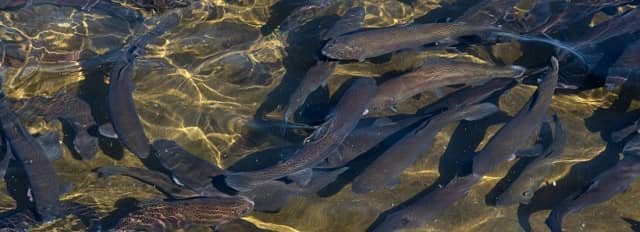
As aquafeeds increasingly incorporate plant-based ingredients, the need for dietary solutions to optimize fish welfare becomes more apparent.
Supplementing the diets of aquatic species with tributyrin has shown to improve growth performance and health status when high levels of plant ingredients are included in aquafeeds.
A recent scientific study, led by The New Zealand Institute for Plant and Food Research Limited, the Interdisciplinary Centre of Marine and Environmental Research (CIIMAR), University of Porto, University of Coimbra, INRAE, and Lucta S.A., delves into the potential of dietary supplementation with tributyrin (TBT), a source of butyric acid, to improve the well-being and performance of rainbow trout (Oncorhynchus mykiss).
They investigated the response of rainbow trout to a diet based on plant meals and supplemented with tributyrin.
Butyric acid and aquafeeds
Diets based on plant ingredients have been tested and optimized for various fish species, reducing the use of fishmeal and fish oil. However, in some fish species, the use of these diets seems to be associated with reduced growth and increased disease outbreaks.
Short-chain fatty acids, including butyric acid, have been included as dietary supplements to counteract or mitigate the potential negative effects of plant-derived ingredients in aquafeeds, improving the immune status.
Butyric acid is a biologically active molecule, and its derived forms have been extensively investigated as aquafeed supplements.
Previous studies have shown beneficial effects of sodium butyrate in rainbow trout when supplemented at 0.25% and 0.5% in a diet containing 18% soybean meal, increasing the growth rate and feed intake.
Tributyrin is a triglyceride composed of butyric acid and glycerol that offers several advantages over butyrate in aquafeeds.
The experimental setup
The researchers used juvenile rainbow trout in the experiment and provided them with four different diets.
These diets ranged from a control diet (CTR), which included 10% fishmeal and 10% fish oil, along with 83% plant-derived ingredients, to diets with increasing levels of TBT. The TBT diets supplied 0.05% (TBT1), 0.1% (TBT2), and 0.2% (TBT4) of the compound.
Results
After 44 days, the researchers evaluated fish performance, feed efficiency, feed intake, and proximal composition. Surprisingly, TBT supplementation had no significant impact on these parameters. Fish fed the TBT diets performed just as well as those on the control diet.
However, when it came to immune and antioxidant responses, the results were quite interesting.
The study found that plasma lysozyme activity was higher in fish fed the TBT2 diet than in those fed the control or TBT4 diets after 3 hours. Additionally, plasma antiprotease activity in fish fed the TBT2 and TBT4 diets was higher than in those fed the control diet after 24 hours.
In the liver, trout fed the TBT4 diet showed higher catalase activity than fish fed the control or TBT2 diets after 3 hours.
Conclusion
In the present study, with a diet containing 83% plant-based ingredients, supplementation with tributyrin at the investigated levels did not improve fish growth or feeding efficiency.
However, the results of this study suggest that dietary supplementation with TBT at levels of 0.1% and 0.2% could enhance immune and antioxidant responses in rainbow trout. This is particularly important when fish are fed diets rich in plant-based ingredients.
Supplementing the diet with tributyrin may enhance fish welfare when fishmeal and fish oil are substantially reduced and replaced with plant-based ingredients in aquafeeds.
In this regard, the use of butyric acid, in the form of tributyrin, represents a promising avenue for future research and application in aquaculture, potentially revolutionizing how we feed and care for our aquatic companions.
The study was funded by the Fundação para a Ciência e Tecnologia (FCT; Portugal), the European Regional Development Fund (ERDF/FEDER) through the Programa Operacional Factores de Competitividade (POFC), and the R&D Unit Center for Functional Ecology – Science for People and the Planet (CFE).
Contact
Leonardo Julian Magnoni
The New Zealand Institute for Plant and Food Research Limited
Port Nelson, Nelson, Nueva Zelanda.
Email: Leonardo.Magnoni@plantandfood.co.nz
Reference (open access)
Leonardo Julian Magnoni, Francisca Silva-Brito, Thais Cavalheri, Carlos Espirito-Santo, Mariana Palma, Rodrigo Ozório, Stephane Panserat, Sofia Morais, Ivan Viegas. Dietary tributyrin supplementation enhances the immune and antioxidant responses of rainbow trout (Oncorhynchus mykiss) without changes in fish performance, Aquaculture Reports, Volume 32, 2023, 101735, ISSN 2352-5134, https://doi.org/10.1016/j.aqrep.2023.101735.

